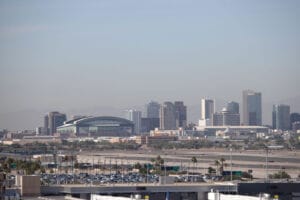Mark Hartman, Phoenix’s chief sustainability officer, has already enabled significant progress in the past year since joining the City of Phoenix team.
Before his arrival, he worked as a lead sustainability officer in Vancouver, B.C., where he was well on his way to achieving his goal of making Vancouver the greenest city by 2020. His desire to expand Vancouver’s effective sustainability efforts led him to accept the position in Phoenix. Since then, Hartman has worked as a catalyst to develop a dialogue with various departments to improve the use of energy, water consumption, to provide cleaner air and to encourage communities to be more self-sustained and healthy.
Phoenix City Manager Ed Zuercher applauded on Hartman’s direction and leadership over the past year.
“The Office of Sustainability’s 2050 Goals will have a significant impact on our community,” Zuercher said. “ Under the direction of Mark Hartman, these goals will be a road map for the city to follow when it comes to sustainability efforts for water, waste, transportation, parks, aviation, public works and air quality. Our goal as a city is to educate, inspire, and empower residents to create a healthy, vibrant, connected community with equitable resources and a thriving economy.”
“As a next step, over the next, the Draft 2050 Goals will be brought to the public and stakeholders for comment and then brought back to City Council for consideration and possible adoption next spring. This type of long-term effort was exactly why the City Council authorized hiring a Chief Sustainability Officer,” Zuercher said.
“Cities could save $17 trillion by using more sustainable practices,” Hartman said. “There are just huge amounts of dollars available by not being so waste-focused and doing things that are more healthy for our society.”
Recently, Hartman worked with the fees sub committee of finance, efficiency and sustainability in developing draft goals for 2050. These included an 80 percent reduction in carbon and transportation emissions and working toward a zero waste goal.
When taking the economic side into consideration, Hartman stressed that businesses and taxpayers will save a significant amount of money by simply asking questions, thinking out of the box and stepping away from the practices that they are used to.
“What cities and businesses are finding is that there’s huge cost savings from actually not being such a waste-orientated society, where we’re really only using 20 percent of the goods we produce,” he said.
Hartman saved the city of Phoenix $1 million per year when he looked into the cost savings of using energy efficient LED streetlights. When he presented the expense report to the city council, the vote to switch to LED lights was unanimous.
Hartman said that living the way we are currently is ineffective, costly and ultimately unsustainable. It is taxing on our society and he has been dedicated to educating both students and businesses alike on a more practical road to a brighter future.
“If you take the total footprint of all the cities globally on an on-going basis, we would need one and a half planets to survive currently the way were living. By 2050 if we keep on this path, we’ll need three planets in order to survive,” Hartman said.
He said that businesses need to consider the use of recycled goods instead of purchasing them at the raw source. The switch would require some design for reconstruction, but ultimately it would result in both significant cost savings and drastic environmental benefits.
“Using materials that have already been produced is much cheaper for businesses than using them raw,” he said. “For example taking aluminum for raw materials as oppose to a tin can uses 20 times more energy.”
Brian Kocour, is president of the Phoenix Green Chamber, an organization that promotes sustainability for business in the community. He has had Hartman speak several times to educate businesses about the advantages of sustainable practices.
“Mark has given us his time to speak with the Green Chamber at lunch and learns and has provided us with a lot of insight on how the city of Phoenix has furthered along education on sustainability and how we can educate and bring awareness to businesses that look at our economy and our market,” Kocour said.
Hartman has also attended over 20 Arizona State University lectures to have a conversation with students about new and innovative sustainability solutions and how they can get involved.
“There are about 8-10 professors that want a city perspective because the students have all these wide-eyed ideas,” Hartman said.
One of Hartman’s major goals is to increase the use of renewable energy in the city of Phoenix. Over the past year, solar energy use has already increased from 6 percent last year to 7 percent. He plans to increase this to 15 percent by the year 2025, which is on par with the utilities goal through the commission.
“It is cost effective to use solar,” he said. “Currently there is a retail price of electricity as 11 cents a kilowatt-hour and the newest solar panels works out to five cents a kilowatt-hour.”
He stressed that ultimately we need to all work toward the goal of zero waste and 100 percent renewable energy, as global warming an issue that grows in concern and urgency with each passing day. To achieve this however it is essential to have someone that initiates the conversation about long-term goals.
“Our waste group can lead the way in achieving zero waste. It’s a very innovative group. It’s really just having someone say we need these long-term goals. Otherwise we’re just going to keep doing what were doing,” he said.
Hartman mentioned a study conducted by the University of Arizona and Stanford University that concluded that 70 percent of Arizona residents believe that climate change is an issue that needs to be addressed.
One of the biggest issues we need to focus on is our food consumption. Animals raised for livestock produce a destructive amount of methane and deplete our scarce water sources.
“Food is 50 percent of our carbon foot print,” he said. “A lot of that has to do with meat consumption. I really like campaigns like meatless Monday.”
A solution he mentioned is to encourage local food production, like farmers markets, which not only has a positive impact on the environment, but also people’s health.
“Huge amounts of our taxes are going into health care and it’s all hidden.”
The state of Arizona currently spends $35 billion on healthcare. If 1 percent of that, or $350 million, were used toward making healthy local food more accessible, it would have an incredible impact.
“The city of Phoenix just recently started a partnership with St. Luke’s Health initiative, we launched a national food policy coalition to double the amount of community gardens by 2020. We’re going to add five new farmers markets to the city of Phoenix.”
Hartman sets a positive example as someone that is creating solutions for one of our generation’s most pressing issues.
“What if the result of us being on this earth could actually make it a better place?” He said. “What if we could make a positive contribution to where the planet is actually better off because were living on it, instead of slowly deteriorating it?”




